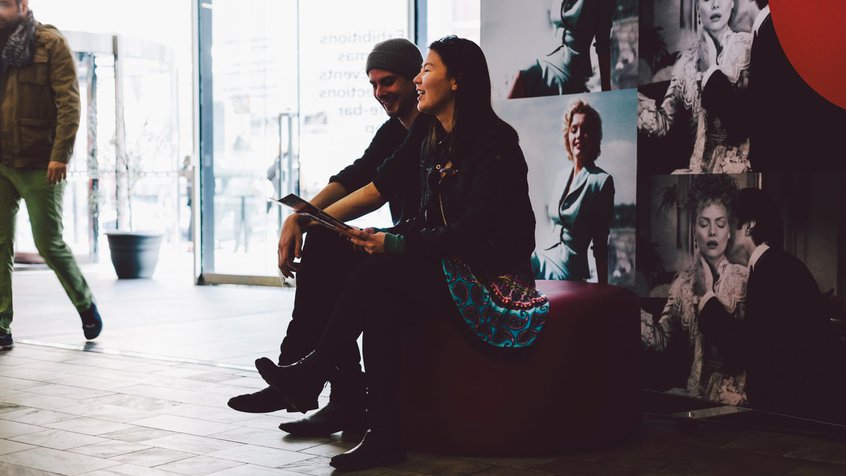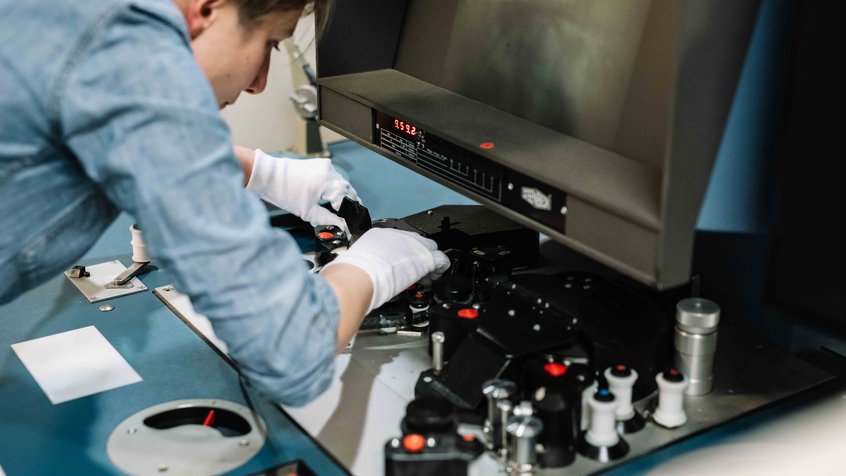Congratulations! You’ve been offered an interview with ACMI. An interview is a two-way conversation where we’re both working out how we might work together. Interviews are about assessing how well you are a “fit” for the role and team, this incorporates the role requirements, the team and the business needs against and your skills, experience, values and personality.
This guide is designed to help you prepare for your interview and put your best self forward. We encourage you to be prepared and have a plan for your interview, this will help you make an informed decision about working with ACMI and enable you to be more confident in the interview.
Preparing for your interview
You will receive a copy of the position description when your interview is confirmed along with the names of the panel members. The interview questions are generally a mix between behavioural, scenario and motivational questions. Here are some tips to prepare yourself for the interview:
- Review your CV and the position description, think about your experience and the role – if you were the interviewer, what do you think they would want to know and what would you ask? – See below for more info!
- Think of some examples in you work history that you can use to talk to each responsibility
- Research a bit more about ACMI and look up who you’re meeting on LinkedIn, this will give you some more insight into the organisation and the panel
- You will be given an opportunity to ask questions, take some time to prepare questions for the panel
- Be organised! Digging through your bag for a crumbled-up CV will not help in making a good impression. Have a pen, a note pad and a clean copy of an up-to-date CV with you
- Make sure you know where you’re going, ACMI has two sites our Museum at Federation Square and ACMIX, Level 4, 2 Kavanagh Street, Southbank and ensure you arrive early!
- ACMI is a fairly informal organisation so there’s no requirement for a suit but we recommend you dress smartly for the interview
Other types of interviews
We will always let you know what type of interview you’re attending beforehand. Here is some more information about our other interview types
- Group Interviews – when we are hiring multiple people for the one role, we will often hold group interviews. These are usually groups of 12 – 15, with a couple of small group scenario activities and a short 1:1 interview with a panel member
- Presentation Interviews – Senior roles, programming roles and marketing roles sometimes include a presentation component on a topic provided by the hiring manager
Reasonable accommodations for interviews
ACMI is committed to building a more diverse workplace. We are open to alternative requests for interviews, including alternative locations, online interviews, bringing a support person or advocate. If you have any other ideas, please contact the People & Culture Team at peopleandculture@acmi.net.au
Interview Day Checklist
Before the interview
☐ I know the time, address and interviewer names
☐ I know how to get there, and how long it will take me
☐ Contact details for the P&C Team saved on phone 03 8663 2200
☐ I’ve researched my interviewer(s) and have an idea of who they are and what they do
☐ I’ve done some research on ACMI and am across important topics
☐ I’ve studied the Position Description and understand the nature and purpose of the role
☐ I have practiced relevant examples, and feel I can cover anticipated questions
☐ I have prepared questions, and will bring these with me
☐ I have a printed up-to-date copy of my CV – just in case
☐ I have a pen and notepad
☐ I know what to wear
☐ I am wearing my lucky socks, and am excited about the opportunity to meet with the panel
During the interview
Do’s:
- Greet your interviewers, try saying their name as you meet them – this will help you remember
- Maintain regular eye contact
- Be your authentic self, you are building a relationship, and this goes a long way in establishing trust
- Ask questions that reflect your understanding of the role and the organisation
- If you don’t understand a question, politely ask the interviewer to repeat or rephrase the question or ask a clarifying question
- Read the room – observe the interviewer’s reactions and course correct or re-answer the question as required
- Discuss the role and team environment, this is your chance to find out information to make an informed decision about your career
- Use the STAR method (seeing below for more info!) to respond to behavioural questions or when providing examples
- The hiring manager will outline the next stages to you in the interview but if you’re not sure, or have other opportunities you’re considering, let the panel know during the interview.
- If you get nervous, take a moment to breathe, we’ve all been in your shoes.
Don’ts
- Leave your mobile on
- Criticise past or present employers – there is such a thing as too much honesty
- Don’t get too familiar, read the room, exercise a bit of restraint
- Avoid discussing remuneration. ACMI generally appoints at the bottom of the band, if your expectations or current salary is higher, let the panel know what your expectations are.
- Don’t respond with Yes and No answers, the panel is trying to get to know you so offer context in your responses
After the interview
It can sometimes take a few days to finalise next steps after your interview. You will be contacted by the hiring manager who will discuss the outcome of your interview with you directly. Should you proceed to the next stage, you may be asked to attend a second interview or to provide references.
Final reminders
- You’ve been invited to the interview because you’re a genuine contender for the role, so you’re already halfway there.
- The interview in not one way, it is also your chance to work out if ACMI and the role are right for you
More interview tips
What’s the STAR method?
You can use the STAR method to respond to behavioural based questions, i.e. questions that start with ‘tell me about a time when’. These questions are designed to help the Hiring Managers understand your approach to problem solving, but also a great way for you to structure examples in your response.
S
Think of a Situation relevant to what the interviewer is asking you about where you were able to produce a positive outcome. Remember to include the ‘who’, ‘what’, ‘where’, ‘when’ and ‘how’.
T
Describe the Task you were responsible for in that situation. Keep it specific but concise. Make sure to highlight any specific challenges you faced.
A
This is where you describe your course of Action. How did you go about problem solving and completing the task? Focus on your contributions and highlight the qualities you possess that enabled you to create an outcome (such as customer service, initiative, teamwork, leadership, communications or technical abilities).
R
Share the Result of the situation, and how you specifically contributed to reaching that outcome. What did you accomplish? What did you learn? What were the results of your actions?
What are scenario questions?
Situational/Scenario based questions focus on what you would do in a particular situation and relate to specifics within the role. Think of a relevant (not identical) situation you have encountered, explain how it is relevant and elaborate.
Examples:
- You have been asked to share your knowledge of processes to a team in another area. How would you communicate your knowledge to this team to ensure that it was understood?
- You are working with a person who consistently makes errors in their work. How would you ensure that the quality of the end product is up to standard?
What are motivational questions?
Motivational & Cultural Questions are the interview equivalent of ‘what’s your favourite food’ – you probably know but it’s hard to choose. There’s no right or wrong, just follow your gut. Be honest and take the opportunity to offer some insight to who you are, and what you value. Examples;
- What do you like about ACMI?
- What are the most satisfying aspects your current role?
- How does this role fit in with your short-term/long term career goals?
- What do you think makes a good leader?
- Describe the work environment in which you will most effectively be able to contribute.
- What do you describe to be your most “natural” ability?
Questions for the panel
Questions for the panel are an important element in ensuring you understand the role requirements and an opportunity for you to clarify not only the role but also the team its culture.
Some examples of questions could include:
- Can you describe a typical day in this role please?
- How would you describe the team culture?
- Who is the main customer, and how does the team contribute to them?
- What can I expect from the first 3 months in the role?
- What qualities are you looking for in a team member?
- How is this job important to the team – how does it contribute?
- What are the business unit goals and priorities for this year?
- What does career progression look like in this position?
- What does success look like in the role?

Frequently asked questions
We've provided answers to some commonly asked questions to assist you in the application process.

Careers
If this job wasn't right for you, take a look at other career opportunities, including volunteering.
